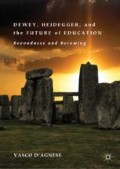Abstract
In this chapter, d’Agnese analyses three features of Heidegger’s thought: creative questioning, being-with and transcending. The Chapter draws attention to the Heideggerian analysis of existence and Dasein’s constitution, arguing that existence and selfhood must be understood as always-already transcending and as always-already moving forward. Otherwise stated, whatever the Dasein thinks or does, whatever its aims and purposes are, it exists and acts as a being always-already projected beyond itself, always-already crossing over. Such a condition is as much displacing as it is educationally promising. Following a Heideggerian path, in fact, we see that when living and educating, we find ourselves in a radically open realm of possibility. In this chapter, d’Agnese also shows that Dasein’s being is a thoroughly being-with. In Heideggerian understanding, knowledge, cognition and thinking are only possible on the ground of Mitda-sein. Moreover, challenging a longstanding tradition that, starting from Socrates’ precept, continues in different ways with Augustine, Descartes and Kant, Heidegger boldly states that to gain any significant understanding of oneself, pure introspection is least helpful; knowing oneself, in Heideggerian thought, is grounded in primordially understanding being-with.
Access this chapter
Tax calculation will be finalised at checkout
Purchases are for personal use only
References
Biesta, G. J. J. (2006). Beyond Learning: Democratic Education for a Human Future. Boulder, CO: Paradigm Publishers.
Biesta, G. J. J. (2010). Good Education in an Age of Measurement: Ethics, Politics, Democracy. Boulder, CO: Paradigm Publishers.
Dewey, J. (1929/1925). Experience and Nature. London: George Allen & Unwin.
Dewey, J. (1930/1916). Democracy and Education: An Introduction to the Philosophy of Education. New York: Macmillan.
Dreyfus, H. (1991). Being in the World: A Commentary on Heidegger’s Being and Time. Cambridge: MIT Press.
English, A. (2013). Discontinuity in Learning: Dewey, Herbart and Education as Transformation. Cambridge: Cambridge University Press.
Heidegger, M. (1971a/1950). Epilogue: A Letter to a Young Student. In A. Hofstadter (Ed.), Poetry, Language and Thought (pp. 181–184). New York: HarperCollins.
Heidegger, M. (1971b/1950). What Are Poets For? In A. Hofstadter (Ed.), Poetry, Language and Thought (pp. 87–141). New York: HarperCollins.
Heidegger, M. (1976/1954). What Is Called Thinking? New York: HarperCollins.
Heidegger, M. (1977/1949). The Question Concerning Technology and Other Essay. New York: Harper & Row.
Heidegger, M. (1982/1927). Basic Problems of Phenomenology. Bloomington: Indiana University Press.
Heidegger, M. (1992/1928). The Metaphysical Foundation of Logic. Bloomington: Indiana University Press.
Heidegger, M. (1992/1929–1930). The Foundamental Concepts of Metaphysics: World, Finitude, Solitude. Bloomington and Indianapolis: Indiana University Press.
Heidegger, M. (1993/1947). Letter on Humanism. In D. F. Krel (Ed.), Martin Heidegger: The Basic Writings (pp. 213–265). San Francisco, CA: Harper.
Heidegger, M. (1996/1927). Being and Time. Albany: State University of New York Press.
Lewis, T. (2014). The Fundamental Ontology of Study. Educational Theory, 64(2), 163–178.
Masschelein, J., & Simons, M. (2015). Education in Times of Fast Learning: The Future of the School. Ethics and Education, 10(1), 84–95.
Stambaugh, J. (1992). The Finitude of Being. Albany: State of University New York Press.
Todd, S. (2015). Education Incarnate. Educational Philosophy and Theory, 48(4), 405–417.
Vlieghe, J. (2010). Judith Butler and the Public Dimension of the Body: Education, Critique and Corporeal Vulnerability. Journal of Philosophy of Education, 44(1), 153–170.
Wrathall, M. (2011). Heidegger and Unconcealment: Truth, Language, and History. Cambridge: Cambridge University Press.
Author information
Authors and Affiliations
Rights and permissions
Copyright information
© 2019 The Author(s)
About this chapter
Cite this chapter
d’Agnese, V. (2019). Creative Questioning, Being-With and Transcending in Heidegger. In: Dewey, Heidegger, and the Future of Education. Palgrave Macmillan, Cham. https://doi.org/10.1007/978-3-030-19482-6_7
Download citation
DOI: https://doi.org/10.1007/978-3-030-19482-6_7
Published:
Publisher Name: Palgrave Macmillan, Cham
Print ISBN: 978-3-030-19481-9
Online ISBN: 978-3-030-19482-6
eBook Packages: Religion and PhilosophyPhilosophy and Religion (R0)

